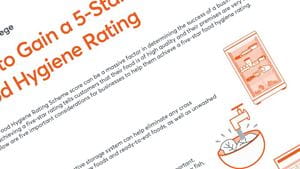What is the Food Standards Act 1999?
In the UK, food safety is of the utmost importance. For organisations and businesses that deal with the handling or preparation of foods, ensuring that you’re complying with food safety laws is a major concern.
Regardless of whether your company is a restaurant chain, food production factory, or a small local-run café, you need to be familiar with the UK food safety laws and regulations and incorporate their requirements into your everyday operations. Without doing so, you place your customers' health, and your company's reputation, at risk.
The risks associated with unsafe food preparation and poor hygiene can have a damaging effect on any individual. With over 2.4 million cases of foodborne illness being estimated to occur every year in the UK, according to the FSA, it’s more important than ever that businesses follow the strict protocols and requirements outlined in food safety legislation.
One of the most significant food safety laws in the UK is the Food Standards Act 1999. Introduced in the House of Commons in 1999, it’s an integral aspect of maintaining good public health in relation to food across the UK. Without it, the country would be faced with major public health consequences.
In the following article, we will explore what the Food Standards Act 1999 is, as well as its aims and role in protecting the public, and the responsibilities that food companies have in the UK in accordance with this legislation.
What is the Food Standards Act 1999?
Within the food and drink industry, there are many rules and regulations that businesses and food handlers must adhere to. While at times these can lengthen food processes, it is crucial that UK food standards remain strict so that customers are kept safe.
As mentioned above, the Food Standards Act 1999 has been in play for decades. But what exactly is it?
The Food Standards Act 1999 is a legislative piece that is used to establish the U.K. Food Standards Agency, which is also referred to as the FSA.
The main goal of the Food Standards Act 1999 is to allow for the Food Standards Agency to protect the health and safety of the public in relation to the production, preparation, and consumption of food. It gives the FSA the authority and rights to protect the public’s health in any instance where it feels that food safety standards are not up to par or are not following regulations.
Why was the Food Standards Act 1999 Created?
The Food Standards Act 1999 was created to provide the U.K. Food Standards Agency with powers and authority to execute actions in accordance with the food regulations outlined by the government and independent food safety organisations. This grants them access to any stage of the supply and food production chain, which means that people can trust that the food they buy and eat is safe and trustworthy.
What is the Food Standards Agency (FSA)?
In order to understand more about the function of the Food Standards Act 1999, it’s first important to understand what the Food Standards Agency, the body that this legislation is pertaining to, is.
Established in 2000, the U.K. Food Standards Agency (FSA) is an independent government agency that operates in order to protect the public health of individuals living in England, Wales, and Northern Ireland in relation to food. The department was actually formed as a result of a number of high-profile outbreaks of foodborne illnesses that occurred across the country. This then sparked a need for the public health of consumers to be prioritised to protect their wellbeing.
What Does the Food Standards Agency Do?
The mission of the UK Food Standards Agency is for the public to be able to trust the food that they purchase and consume. Not only does the department work to reduce the direct impacts that poor food safety and hygiene practices can have on individuals' health, but it also functions to reduce the burden felt by the economy when foodborne illness rates spike.
Outbreaks of foodborne illnesses can have detrimental impacts on the economy in the UK. Therefore, the FSA holding food businesses accountable for maintaining a high standard of food safety and hygiene in line with legislation can ensure that the food industry in the UK maintains a good reputation in the country and abroad.
What Role Does the Food Standards Act 1999 Have in Protecting the Public?
Without the Food Standards Act 1999, the FSA would not have been established with the powers necessary to enable it to act in the consumer’s best interest at any stage in the food production and supply chain.
Whilst the Food Standards Act 1999 doesn’t directly influence the operation of food businesses if they have poor food safety and hygiene, it does grant the FSA the power to do this. It’s also worth highlighting that the U.K. Food Standards Agency's main organisational and accountability arrangements are provided for in the Act, which also outlines powers to establish a scheme for the notification of results of tests for foodborne diseases.
This means that, indirectly, the Food Standards Act 1999 plays a critical role in protecting public health in relation to food by supporting the continued operation of the FSA.
Who Does The Food Standards Act 1999 Apply To?
The Food Standards Act 1999 applies to all types of food businesses. Whether you’re a large-scale chain restaurant, an independently owned coffee shop, or a company which supplies food products to food businesses across the country, the Food Standards Act 1999 is important to you. As such, it’s critical that you are aware of the Food Standards Act 1999 and its purpose in protecting the public health of individuals across the UK.
Who is Responsible for Food Safety in a Food Business?
The individual who owns the business, and their employees, are responsible for ensuring that food safety and hygiene standards are met. These individuals also have to ensure that any procedures and requirements as outlined by food safety laws and regulations are followed at all times.
Given that employees working for food businesses will have to engage in tasks that involve an understanding of food safety and hygiene, it’s important that these workers have acquired the knowledge and skillsets associated with this. Here at Virtual College, we offer a variety of food safety and hygiene courses suitable for employees to learn how to responsibly act when handling and producing foods and while operating in a food environment.
What Are The Responsibilities of a Food Business in Line with UK Food Safety Legislation?
In line with the Food Standards Act 1999, food businesses must ensure that they comply with this food safety legislation by:
- Ensuring that they do not include or remove anything from food or treat food in any way that means it would be damaging to the health of people eating it.
- Ensuring that food served or sold is of the nature, substance, or quality that consumers would expect.
- Ensuring that the food is labelled, advertised, and presented in a way that is not false or misleading.
Imported food must meet food safety and hygiene requirements outlined in the Food Safety Act too, and may be subject to checks by enforcement authorities at UK points of import and inland.
What is The Future of Food Safety in the UK?
Moving forward, the U.K. Food Standards Agency recognises that there are growing challenges surrounding food safety, affordability, security, and sustainability in the food industry. In order to address these, the organisation produces strategies every cycle to address issues relating to food safety.
During these strategies, the body also finds ways to address these issues and improve the trust, safety, and sustainability of food consumed across the country.
The FSA uses science as well as legislative and non-legislative tools in order to do this in as objective a way as possible. Their approach to the topic of food safety and hygiene is also open and engaging to better public health relating to food across the UK.
FAQs
What is the Waste Regulations Act 2012?
The Waste Regulations Act 2012 is a form of legislation that came into effect in April 2012, which replaced the preexisting waste control legislation referred to as the Controlled Waste Regulation 1992.
The Act classifies waste as industrial, commercial, or household, and introduces disposal charges to a selection of non-domestic household waste producers. It also enforced these charges on particular premises that are noted as producers of household waste and are identified as producing commercial waste.
What is the Main Aim of the Food Safety Act?
The Food Safety Act 1990 is a parliamentary act in the UK which functions to ensure that all businesses do not influence food to make it unsuitable for human consumption. This Food Safety Act works to protect human health and has multiple aims, including:
- To provide power to the FSA to act accordingly in line with the law and deliver offences to protect the public.
- To make sure that all food meets consumers’ expectations with regard to the food’s quality, substances, and nature.
Which Law Introduced the Need for HACCP?
The Council Directive 93/43/EEC enforced by the European Union (EU) during the 1990s was the first regulation that made HACCP a legal requirement amongst all EU member states. Whilst the UK is no longer in the EU, all regulations and legislation enforced by the EU before the UK’s exit is still enforced,
Article 5 of the regulation states that “food business operators shall put in place, implement, and maintain a permanent procedure or procedures based on the HACCP principles.”
Summary
The Food Standards Act 1999 is another key piece of UK legislation that helps to protect the public health of those living in the UK in relation to food. Without its being in effect, the FSA would not have the power it does in our current day and age to behave in a way that is best aligned with consumer interests.
Our article aimed to offer you an insight into what the Food Standards Act 1999 is, as well as the FSA’s role in relation to this legislation and how this ties into your responsibilities as a business owner or employee. We hope that this has therefore offered you the insight that you need to grasp this topic further.
For those looking to grasp the concepts of food safety and hygiene at a basic level, our ‘Level 1 Food Safety and Hygiene’ course may be an ideal choice. Alternatively, if you’re more knowledgeable about food safety and hygiene, our ‘Level 2 and 3 Food Hygiene Training Package’ will further develop your insight into food and safety.

























































